Have you ever wished you could be a fly on the wall? Or a stealthy ninja? Or the invisible man?
Unfortunately, invisibility, legendary martial arts skills, and transfiguration aren’t within everyone’s reach.
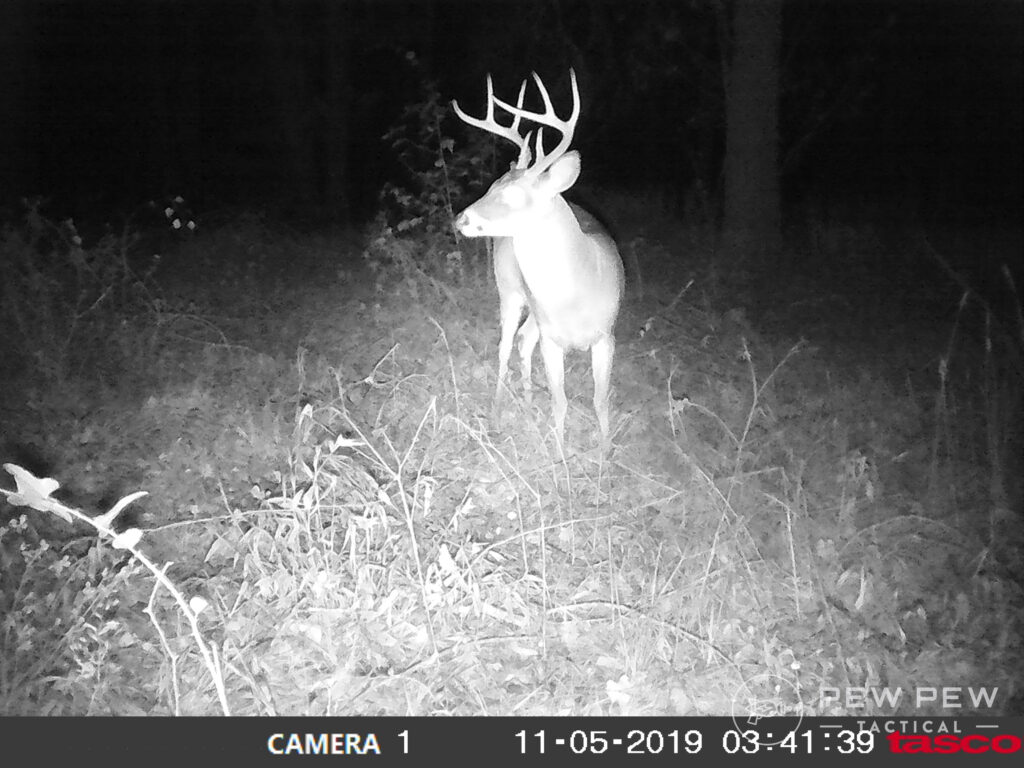
While a quality trail camera won’t bestow invisibility, it will let you be the proverbial fly on the wall when you want to watch game animals without disturbing them or document activity for home security.
If you’re new to the world of trail cams, and the specs look like muddled math problems, we’ve got you covered. We’ll explain what a trail cam does, what to look for when shopping for a trail cam, and what to avoid.
We even have a few recommendations for every budget to help you out.
THE QUICK LIST
-
Best All-Around Option
-
Best Companion App
-
Best for Nighttime Photos
-
Affordable Cellular Connectivity
-
Best Budget Option
Table of Contents
Loading…
How We Chose the Best Trail Cameras
Input for this article came from the hunting staff of Pew Pew Tactical. The freelance writers and editors behind it selected the models based on features, price, value, durability, and time spent with the models.
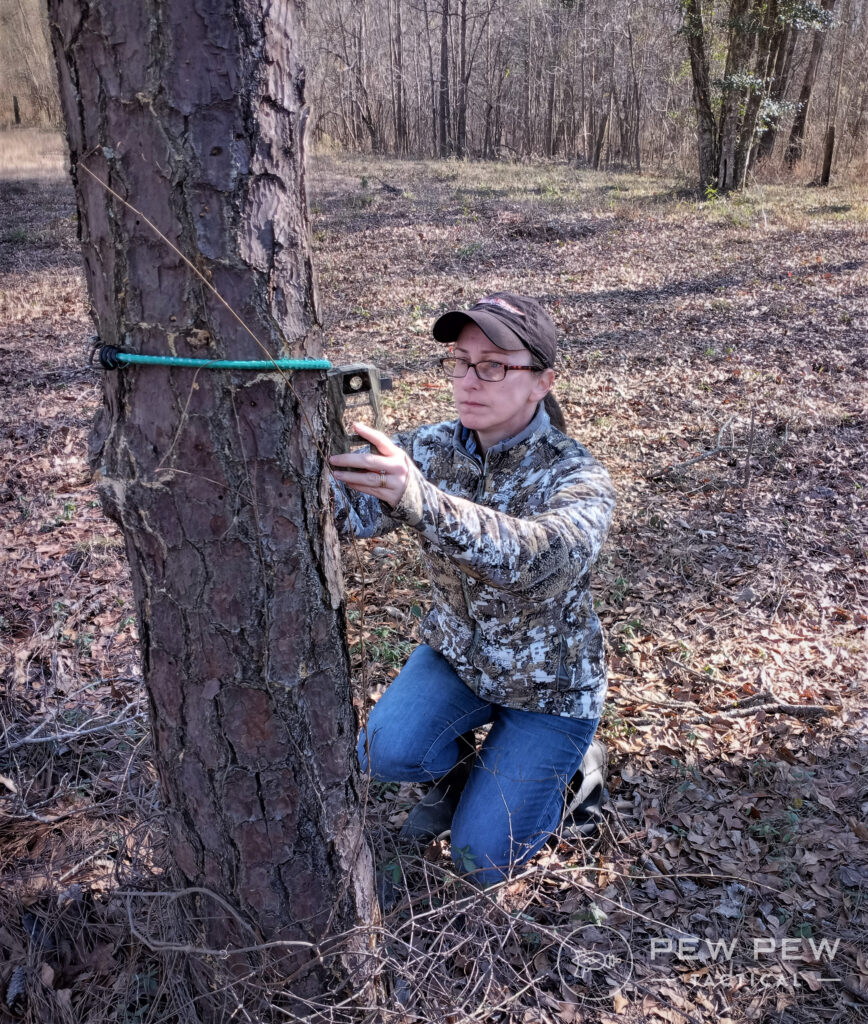
The products selected were determined to be the best in each of their respective categories.
Best Trail Cameras
1. Moultrie Mobile Edge Pro Cellular Trail Camera – Editor’s Pick
Prices accurate at time of writing
Prices accurate at time of writing
-
25% off all OAKLEY products - OAKLEY25
Copied! Visit Merchant
Pros
- Excellent resolution
- Multi-network cellular coverage
- Built-in memory
Cons
- Integrated memory is limited to 32gb
Specs
- Resolution: 36 mp
- Video resolution: 1080p
- Detection range: 100 ft
- Trigger speed: 0.5 s
- Cellular connectivity: Yes
Features
- Burst mode
- Compatible with solar-power accessories
- Built-in memory, no SD card required
- False Trigger Elimination technology
- Auto-connect nationwide coverage
If you want to monitor an area without disturbing it, the Moultrie Mobile Edge Pro is a dream come true. It sends images directly to your smartphone in real-time.
This is the luxury sports car of the cellular trail camera world. Not only does it include standard features like a .5-second trigger speed, full HD video or high-definition photos, and a 100-foot detection range, but it is jam-packed with top-notch features you won’t find on other trail cams.
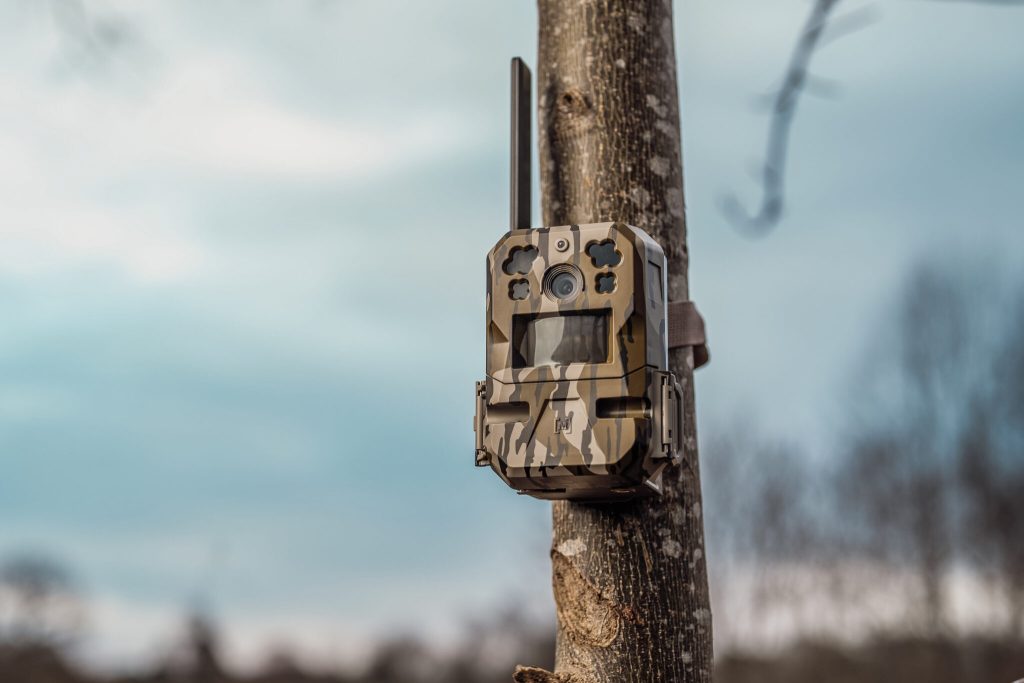
After you set it, you won’t have to set foot in the area until the batteries die. Be prepared; this thing takes either eight or 16 AA batteries and can burn through them quickly, especially if you have the camera set for immediate uploads.
However, you can opt for Moultrie’s 10W Universal Solar Panel Power Pack, and you’ll never have to stomp through the woods to swap out batteries ever again.
-
25% off all OAKLEY products - OAKLEY25
Copied! Visit Merchant
Unlike most cellular trail cams, the Moultrie Mobile Edge Pro has built-in memory, so no separate SD card is required.
It also has a Live Aim function that allows you to snap a test image in the field. This feature takes the guesswork out of positioning your camera because you can view the image in real-time on your phone.
The Moultrie Mobile Edge Pro also features Smart Zone technology, which gives you total control over the areas in the field of view that motion will set off the camera trigger.

Anyone with trail camera experience has probably dealt with dangling branches or waving grass, sometimes triggering hundreds of unwanted photos. Smart Zone lets you shut off detection in those zones so you only get shots of actual animals (or people).
My all-time favorite feature on this camera is the onboard AI Smart Capture, which allows you to filter captures by species. Want only images of bucks? No problem. AI Smart Capture ensures you only get pictures of the animals you want.
2. Moultrie Mobile Edge Cellular Trail Camera – Best All-Around Option
Prices accurate at time of writing
Prices accurate at time of writing
-
25% off all OAKLEY products - OAKLEY25
Copied! Visit Merchant
Pros
- Good battery life
- Good picture quality
- Easy-to-use app
Cons
- Bulkier
- Integrated memory limited to 32gb
Specs
- Resolution: 33 mp
- Video resolution: 720p
- Detection range: 80 ft
- Trigger speed: 0.65 s
- Cellular connectivity: Yes
Features
- Built-in memory, no SD card required
- Auto-connect nationwide coverage
- Low-glow IR LED flash
We get it. The Edge Pro runs a tad on the expensive side.
But If you don’t need all the bells and whistles, Moultrie Mobile’s Edge model has all the Pro’s standard features with a much more affordable price tag.
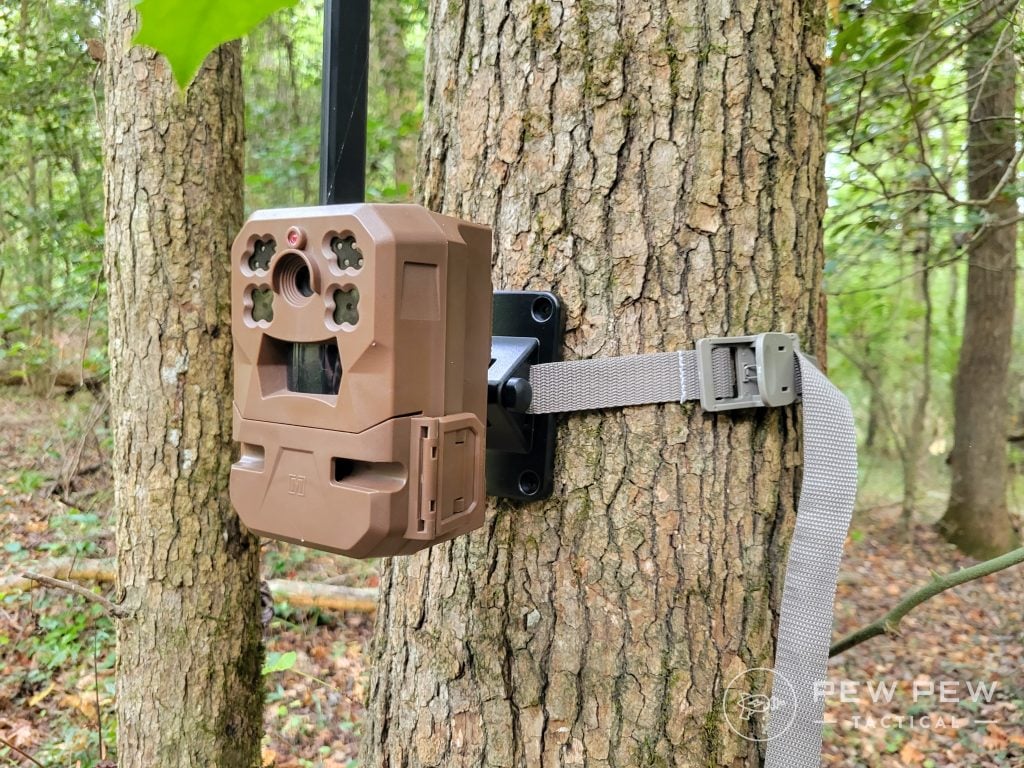
It has only a slightly shorter detection range and almost imperceptibly lower image quality.
However, users can still enjoy on-demand photos and video, built-in memory, automatic network coverage, and solar panel compatibility.

3. Wildgame Innovations Encounter 2.0 – Best Companion App
Prices accurate at time of writing
Prices accurate at time of writing
-
25% off all OAKLEY products - OAKLEY25
Copied! Visit Merchant
Pros
- Excellent photo management app
- AIM systems auto-sorts pictures with good accuracy
Cons
- Must choose a single wireless network
- No audio recording
Specs
- Resolution: 26 mp
- Video resolution: 720p
- Detection range: 80 ft
- Trigger speed: 0.5 s
- Cellular connectivity: Yes
Features
- Compatible with Verizon or AT&T networks
- Artificial Intelligence Management (AIM) system
- 32gb SD card included
The Encounter 2.0 cellular trail camera from Wildgame Innovations is packed with handy features, including a fast half-second trigger speed, an ample 80-foot detection range, and on-demand photos and videos.
Most cellular trail cameras are moving to automatic network coverage that connects to whichever cell signal is strongest in the area.
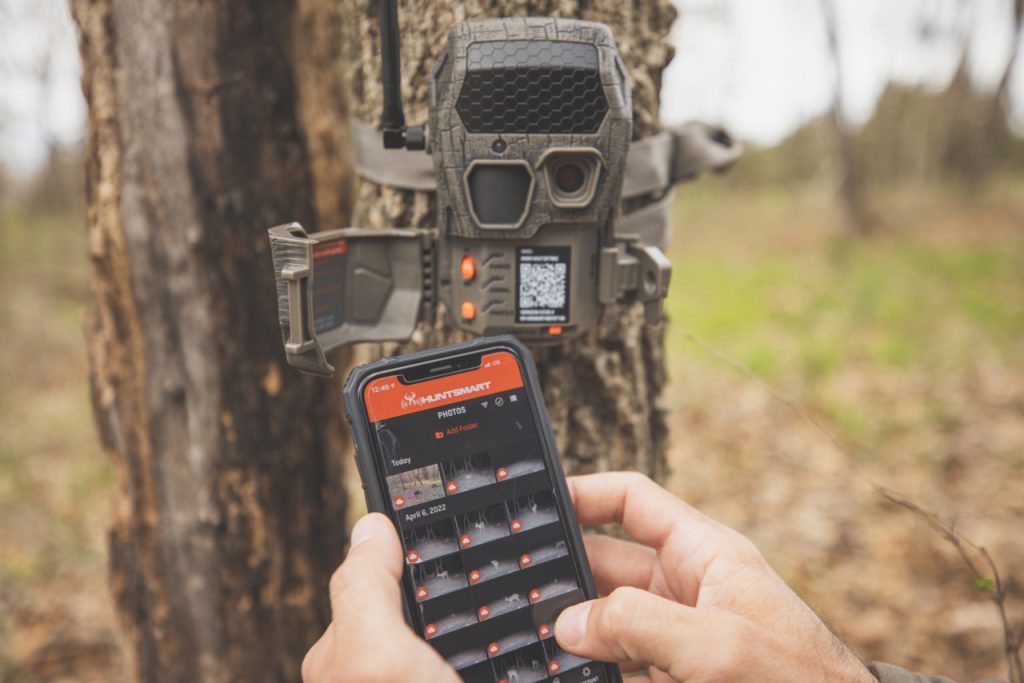
However, the Encounter has singular provider functionality. You’ll need to choose either Verizon Wireless or AT&T versions. I recommend checking your area’s cell signals before you invest in a model.
I love the user-friendly HuntSmart app that this camera uses. It’s easily my favorite app for managing trail camera photos.
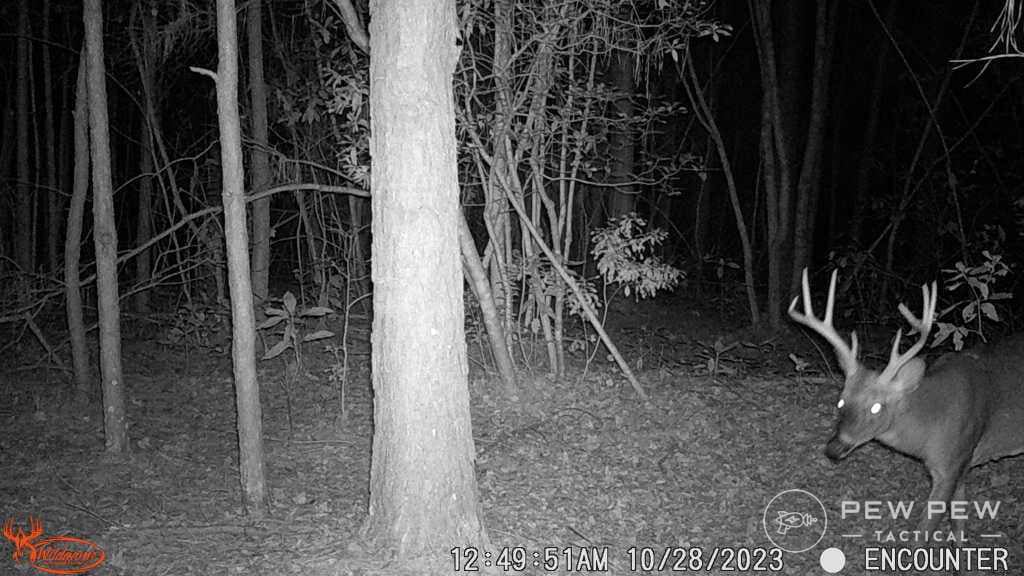
I also enjoy the Encounter’s Artificial Intelligence Management (AIM) System. This feature analyzes the camera’s photos and then organizes them based on content. It filters for bucks only, animals, or nothing, so you can save time sorting through those hundreds of squirrel photos that every trail camera seems to send you.
4. Browning Dark Ops Full HD Extreme – Best for Nighttime Photos
Prices accurate at time of writing
Prices accurate at time of writing
-
25% off all OAKLEY products - OAKLEY25
Copied! Visit Merchant
Pros
- Great battery life
- Invisible IR illumination
- Fast trigger time
Cons
- No cellular connectivity
- Daylight images could be better
Specs
- Resolution: 22 mp
- Video resolution: 1080p
- Detection range: 80 ft
- Trigger speed: 0.13 s
- Cellular connectivity: No
Features
- RADIANT 4 night IR illumination
- Up to 8 multi-shot or rapid-fire images
- Invisible infrared LED illumination
Illuma-Smart Technology automatically adjusts IR Flash
The Dark Ops Full HD Extreme has an adjustable trigger speed (0.135 – 0.7 seconds), a rapid recovery time (0.5 seconds), and an invisible flash.
This camera excels at nighttime captures. It features an infrared flash up to 90 feet and RADIANT 4 Night Illumination Technology, which enhances the night IR flash modes.
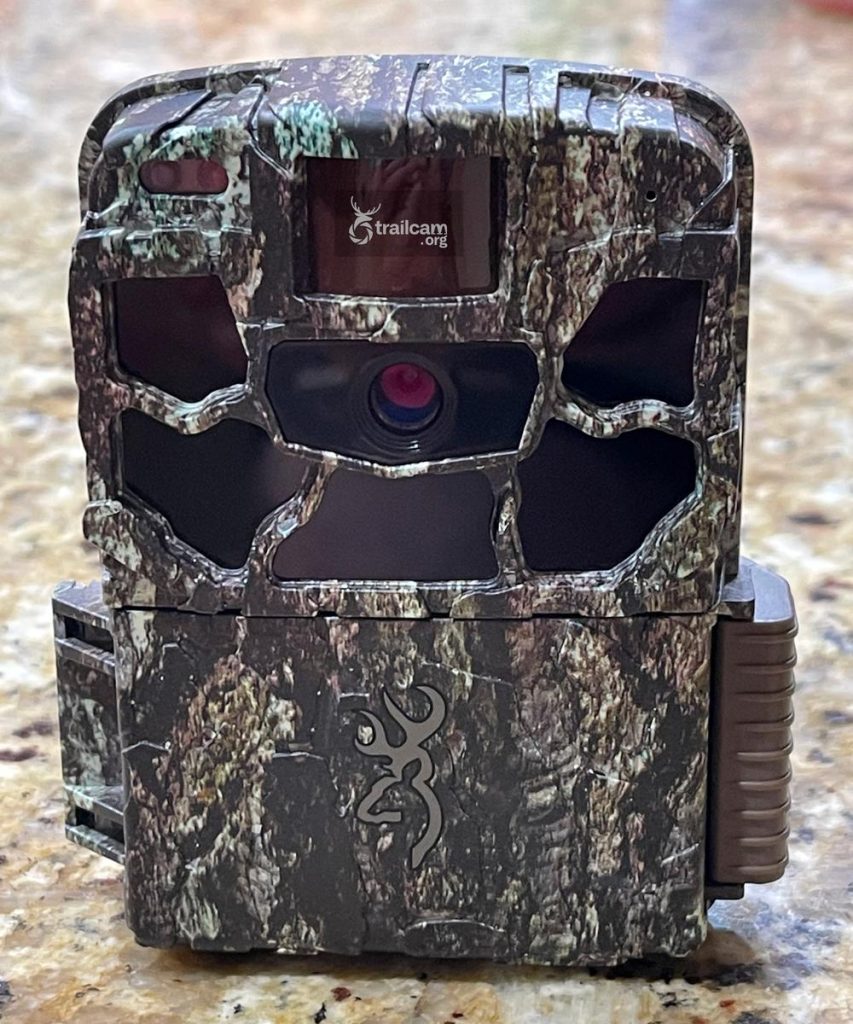
In High Power Mode, you get longer flash ranges. In Fast Motion Mode, you get a faster shutter speed, which produces clearer after-dark images of animals in motion. This allows you to customize the camera’s settings to meet your specific trail camera needs.
While this one won’t send images or video to your phone, it does record them on an SD card.
What’s your take on the Browning trail cam?
5. Muddy Matrix Cellular Trail Camera – Affordable Cellular Connectivity
Prices accurate at time of writing
Prices accurate at time of writing
-
25% off all OAKLEY products - OAKLEY25
Copied! Visit Merchant
Pros
- Affordable cellular camera
- Dual-network capability
- Good resolution
Cons
- SD card not included
Specs
- Resolution: 36 mp
- Video resolution: 1080p
- Detection range: 80 ft
- Trigger speed: 0.4 s
- Cellular connectivity: Yes
Features
- 1080p Full HD Video with audio
- Automatic network coverage
- Dual Network AT&T and Verizon carrier with preinstalled SIM card
In the not-so-distant past, you couldn’t get your hands on a cellular trail camera for less than $200.
Now that everybody and their brother wants one, the demand for an affordable remote camera with wireless connectivity has driven prices into more reasonable territory.
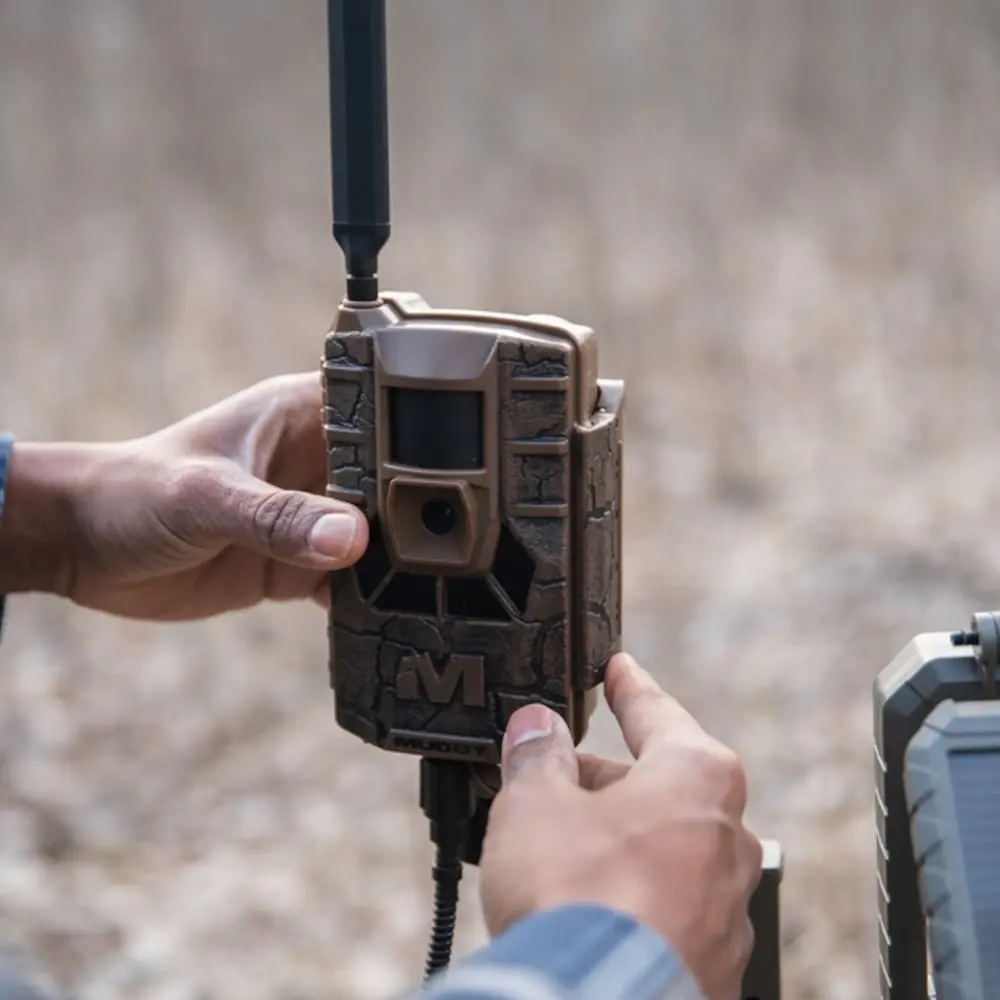
The Muddy Matrix is one of the more affordable cellular trail cameras today, priced well under $200. Just download Muddy’s Command app, pay for a plan, and you’ll receive pictures from your remote camera right to your smartphone in actual time.
This cam sports a 0.4-second trigger speed and an 80-foot detection range. It also takes better-than-decent photos and videos.
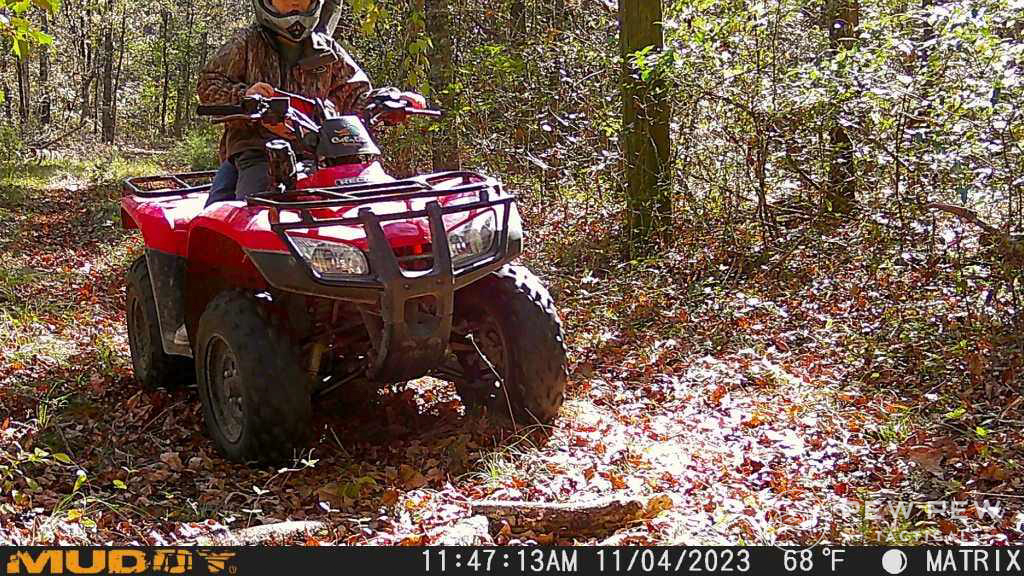
6. Wildgame Innovations Terra Extreme – Best Budget Option
Prices accurate at time of writing
Prices accurate at time of writing
-
25% off all OAKLEY products - OAKLEY25
Copied! Visit Merchant
Pros
- Very affordable
- Good battery life
Cons
- Picture quality could be better
- No cellular connectivity and SD card not included
Specs
- Resolution: 14 mp
- Video resolution: 720p
- Detection range: 65 ft
- Trigger speed: <0.75 s
- Cellular connectivity: No
Features
- Compatible with SD card up to 32 GB
- Battery life of up to one year or 30,000 photos
The Terra Extreme from Wildgame Innovations is a nice option for people who don’t want to spend a ton of money on a fancy game camera.
These puppies are priced under $50…so run a string of them to cover a wide range of property.
Offering a no-frills game cam, it still delivers decent pictures and relatively clear video.
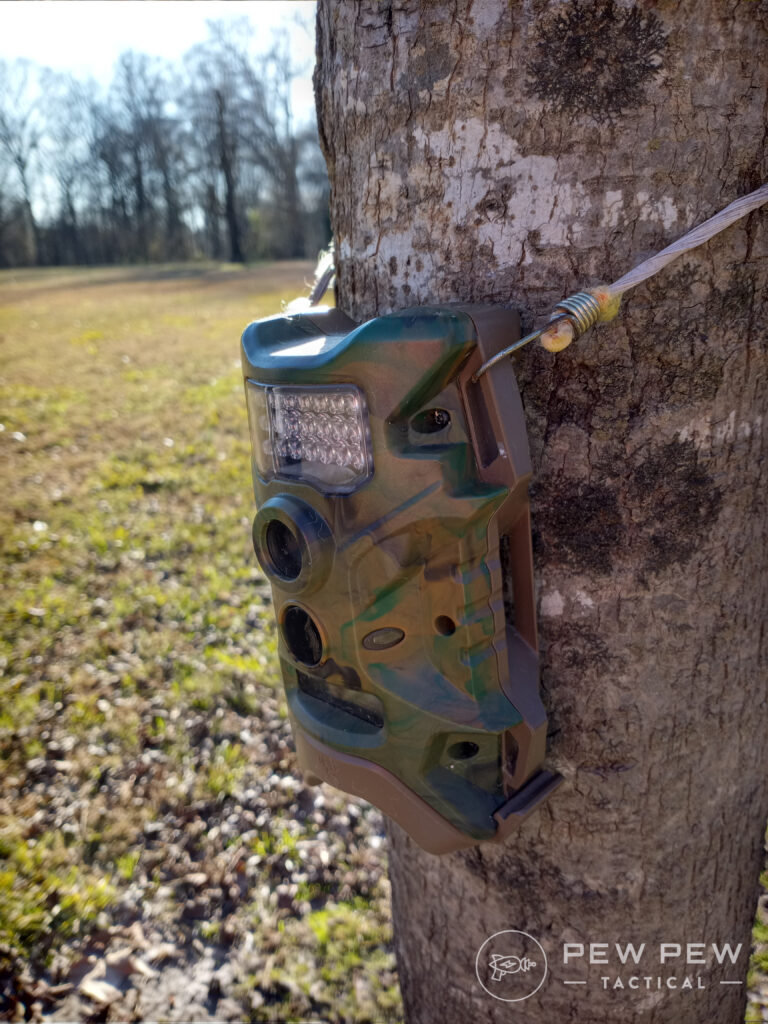
It uses eight whole AA batteries, but one fresh set should last most of a year.
This camera is a serious workhorse! Mine served me well for several hunting seasons before a colony of ants set up residence in the innards. Spoiler alert: ants and electronics do NOT mix.
Honorable Mentions
BOG Blood Moon & Clandestine
Prices accurate at time of writing
Prices accurate at time of writing
-
25% off all OAKLEY products - OAKLEY25
Copied! Visit Merchant
Pros
- Lightning fast trigger speeds
- Good nighttime photo quality
- Solid battery life
Cons
- No cellular connectivity
- Expensive
Specs
- Resolution: 22 mp (Blood Moon), 18 mp (Clandestine)
- Video resolution: 1080p
- Detection range: 100 ft (Blood Moon), 80 ft (Clandestine)
- Trigger speed: 0.04 s (Blood Moon), 0.2 s (Clandestine)
- Cellular connectivity: No
Features
- Blood Moon features Dual Sensor technology with a dedicated nighttime lens
- 3″ full-color removable viewing screen
- Compatible with up to 512gb SD cards
Up to 1 year of battery life with the BOG rechargeable lithium battery pack
BOG has two camera models, and both are pretty awesome. The Blood Moon is the flagship 22-megapixel model, while the Clandestine 18-megapixel model is a little cheaper. Aside from the megapixel count, they stack up almost evenly feature for feature.
Both take six AA batteries, both have a removable viewer (very nice!), and both have multi-shot, video, single-image, and time-lapse modes. Even the capture speeds are the same.
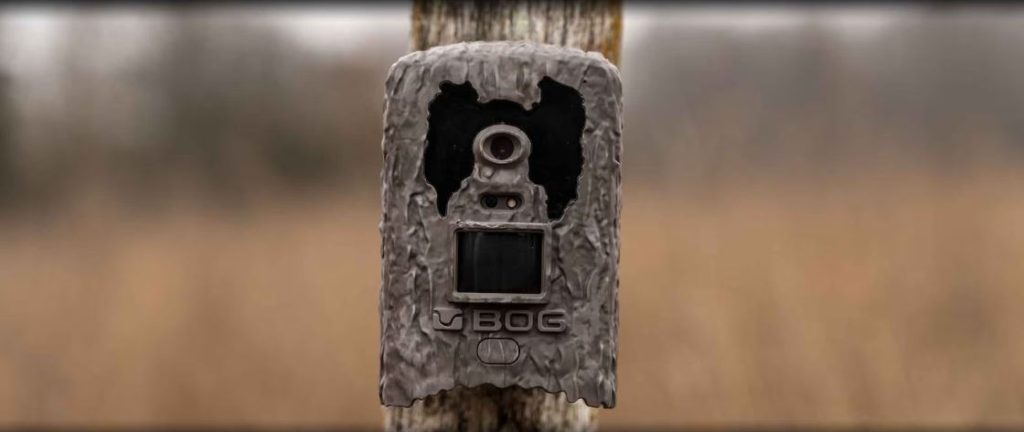
The only differences are the camera quality and the flash range. Blood Moon has a 120-foot infrared flash and a 100-foot detection range, while the Clandestine only has 100-foot and 80-foot ranges.
Dollar for dollar, though…I think you’re better off with the Blood Moon. The street price difference is only about $20-35 per camera, and you get a much better image and better ranges at night. For such a small upcharge, you might as well send it.
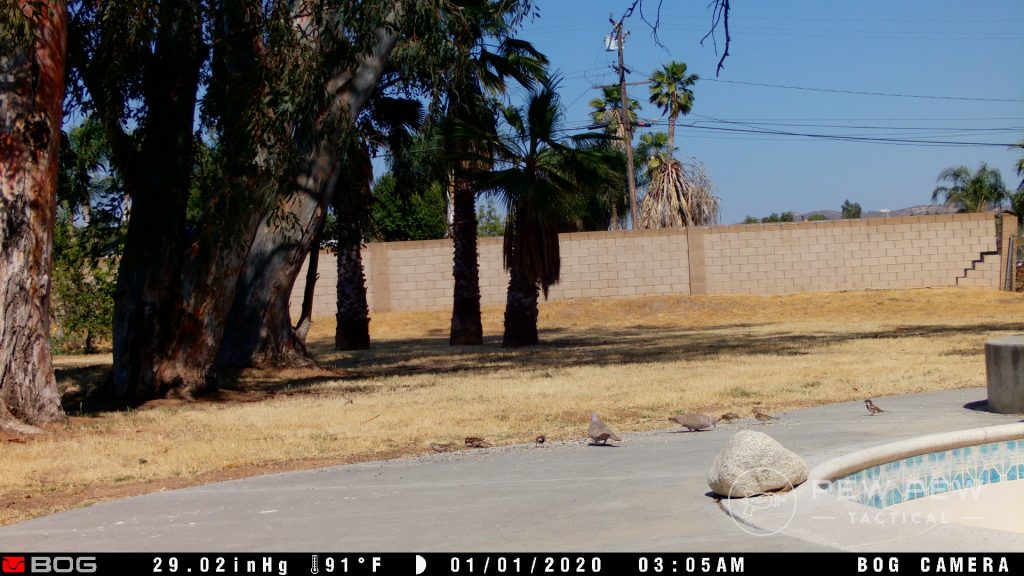
The removable image viewer is awesome, the unit is durable as hell, and the pictures are great!
If you’re really wondering what 22 megapixels and 18 megapixels look like side by side, here you go. It’s just a picture of a rock and a wall at 50 yards, but it does a great job of showing the difference when you’re zoomed in. Zoomed out…both images look pretty much the same.
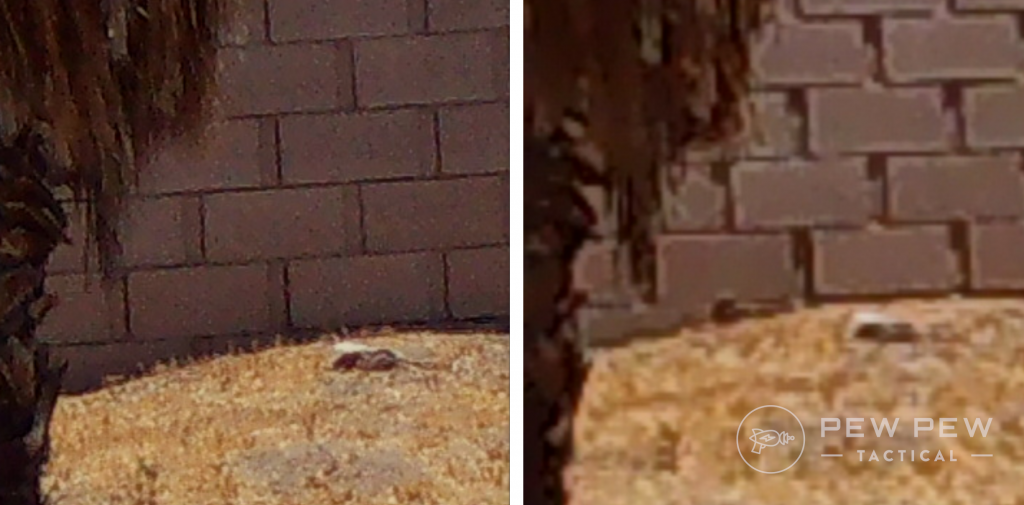
Stealth Cam Prevue 26
-
25% off all OAKLEY products - OAKLEY25
Copied! Visit Merchant
Pros
- Affordable
- Decent picture clarity
- Integrated viewing screen
Cons
- SD card not included
- Only supports up to 32gb of memory
Specs
- Resolution: 26 mp
- Video resolution: 720p
- Detection range: 80 ft
- Trigger speed: 0.4 s
- Cellular connectivity: No
Features
- Burst mode with 1-6 images
- Supports up to 32gb SD cards
- 2.4″ color TFT screen
For a relatively cheap camera, the Stealth Cam Prevue 26 performs surprisingly well.
With a 26-megapixel camera, thin-film-transistor liquid-crystal display (TFT LCD), and a 0.4-second trigger speed, this trail cam punches well above its price point.
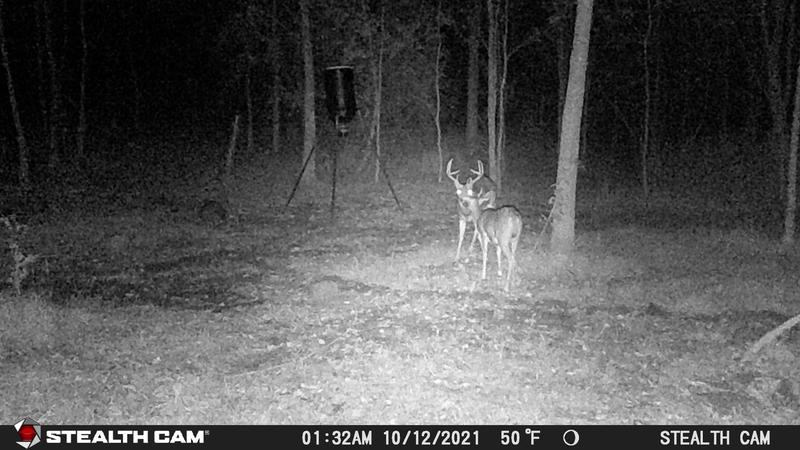
It’s also super easy to set up, thanks to its three preset modes and live viewfinder that shows you what the camera is actually seeing.
What is a Trail Camera?
Sometimes called game cameras, camera traps, or remote cameras, trail cameras are usually triggered by movement or body heat.
When the camera senses activity, it automatically snaps a picture or records a video.
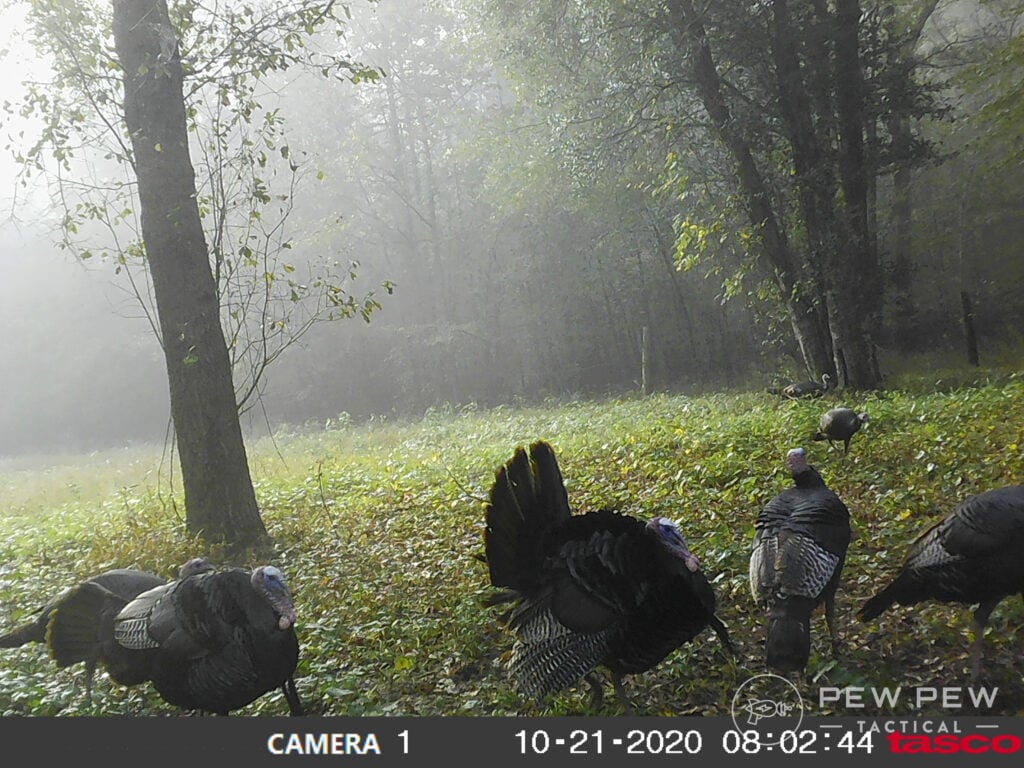
Regularly used by hunters, a trail camera is a great way to scout for trophy animals without interrupting their natural behavior patterns.
Because trail cameras provide 24/7 surveillance, they are also effective tools for home security.
How to Choose the Best Trail Camera
Understanding the relative strengths and weaknesses of the different trail cams on the market will help you pair the right camera with the right job.
Here is a quick run-down of the key trail camera features you want to consider when shopping.
Trigger Speed
Trigger speed is the amount of time it takes for your trail cam to snap a photo after it detects motion. An ultra-fast trigger speed isn’t always necessary for every application.
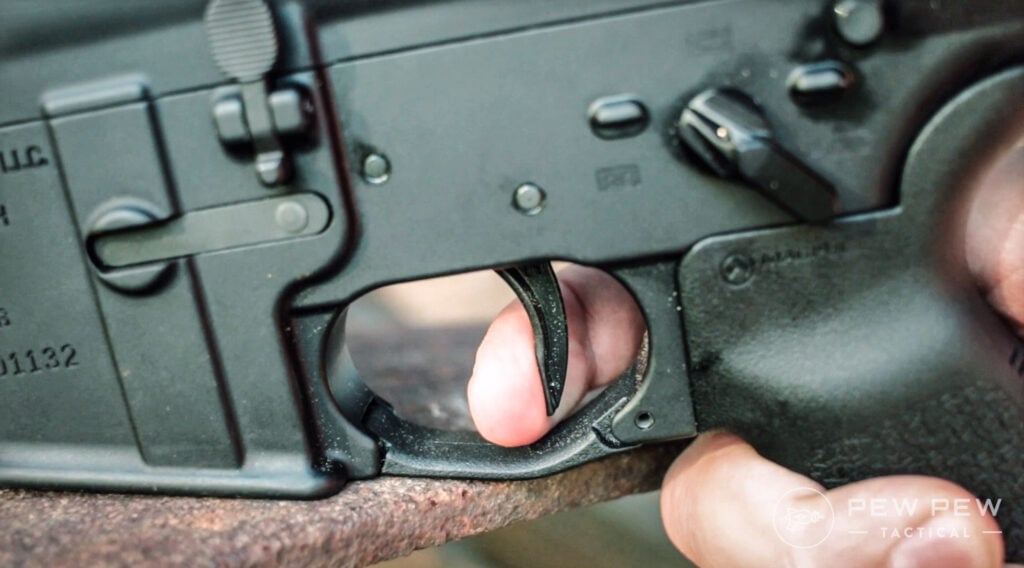
If you’re recording activity over a game feeder or food plot, trigger speed won’t be as important because your subjects are likely to linger in the area.
However, if you’re patrolling a game trail, trigger speed becomes far more important because you’re dealing with animals on the move.
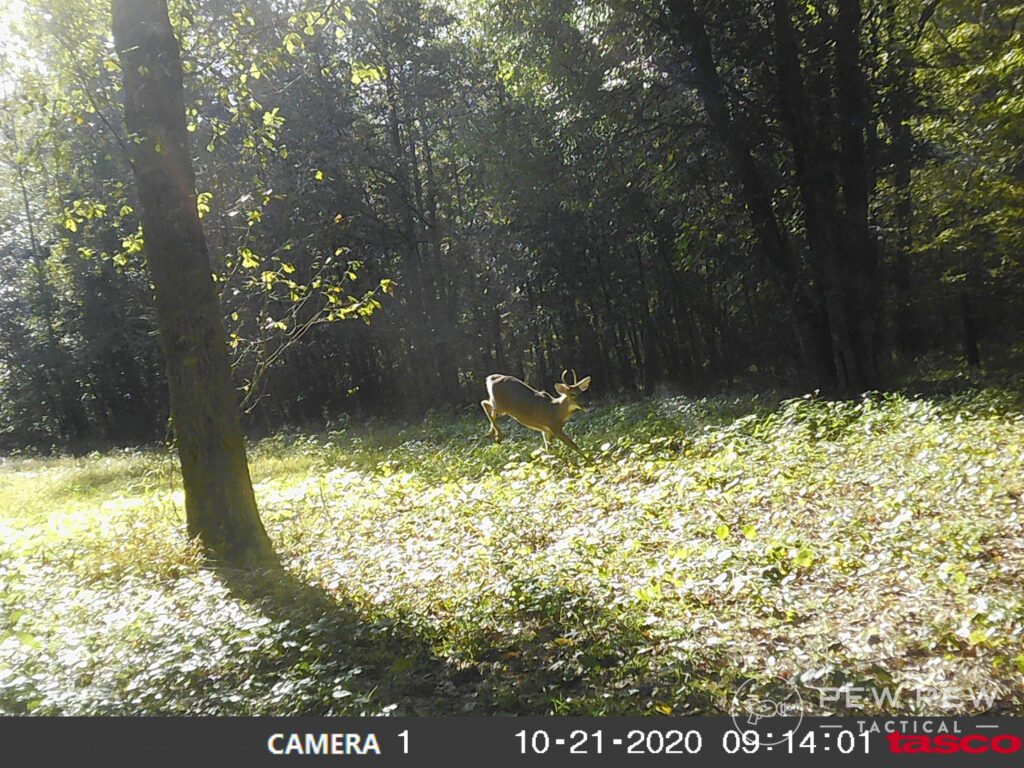
You don’t want a big buck to trigger your camera only to be well on his way out of frame by the time the camera snaps an image.
A trail cam with a hot trigger speed will allow you to catch that monster wall-hanger in all of his slob-knocking glory.
Recovery Time
Recovery time is the amount of time your camera needs between shots. Just like slow trigger speed can cost you important photo ops, so can slow recovery times.

Sure, you may have snapped a great pose from a hot doe on the move. But if it takes your trail cam too long to recover after that first shot, you’re liable to miss the hot buck that’s following her.
Both trigger speed and recovery time are also important for home surveillance. Being able to snap several photos in quick succession could help you identify hoodlums bent on stealing or destroying your property.
Detection Zone
The camera’s detection zone is exactly what it sounds like — it’s the zone in front of the camera where movement triggers a photo.
Some can detect motion in almost a 180-degree range. This lets you capture subjects that may slink just to the side of the camera. There’s even a model that captures photos in a complete 360-degree circle.

The detection zone isn’t just about width, however. Detection range also determines that zone, or how close to the camera sensor, the movement needs to be to activate the sensor.
If you’re using a series of trail cameras for home surveillance, the detection zone will determine how close together you need to place your devices so you don’t miss any action.
Flash Range
Another important factor to keep in mind is flash range. Flash range is critical for capturing nighttime shots.
You don’t want movement to trigger your camera only to have the subject hidden in shadow because the flash range doesn’t extend far enough to light up your image.

Speaking of flash, trail cameras typically come in three different types – no glow, low glow, and white.
Trail cameras with a no glow flash (also referred to as “blackout” or “dark ops” cameras) use black LEDs for nighttime illumination. Although the flash range is usually shorter than that of other flash types, the light is completely invisible to both animals and humans.
All of your after-dark images will appear in relatively low-quality black and white with no glow flash.
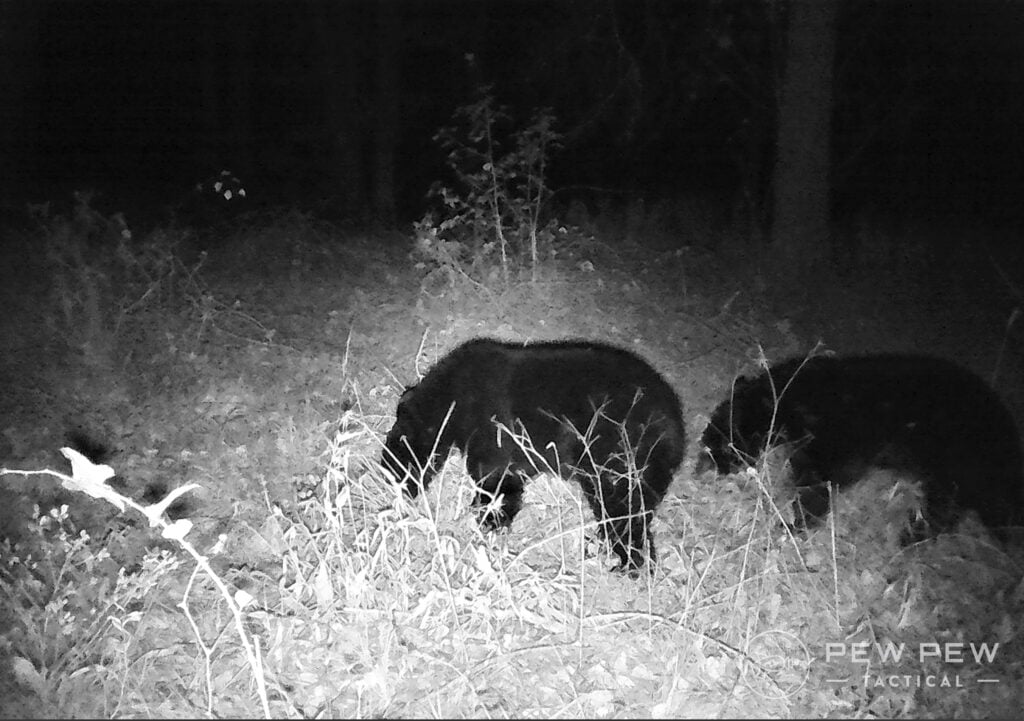
Sometimes called “red glow,” low glow flash uses infrared emitters to light up your night images.
These cameras produce a faint red glow that animals can’t see. However, humans (at least those who are paying attention) will detect the IR light when a photo is snapped.
Your nighttime pictures will still be in black and white. However, the quality of low glow flash images is typically better than no glow.
White flash game cameras work just like your standard digital camera.
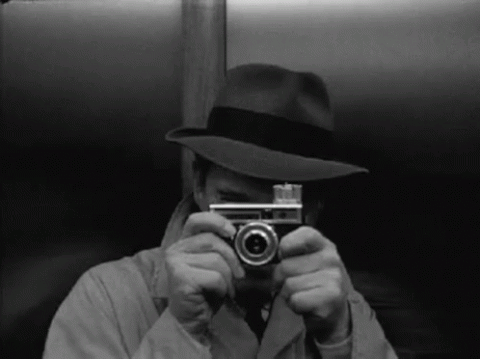
These cameras provide the best image quality, and all of your photos (both day and night) will be in full color.
The major drawback? It’s highly visible, which could send both human intruders and wary whitetails fleeing for the county line.
Video Capabilities
Video capture is a relatively new feature in the game camera industry, but it’s a train nearly every company is hopping on.
Some cameras do this really well. Others produce videos that look like they were filmed on a potato. If you have your little heart set on a game camera that shoots video, pay serious attention to resolution.

A camera with 640×480 resolution will produce video in standard resolution (i.e., potato quality). If you want high-definition video, look for a camera with 720p, 1080p, or higher resolution.
Different cameras also capture different video lengths. Thirty seconds is pretty standard, although some will record up to several minutes.
As a hunter, I’m not all that interested in video capabilities. Still shots usually provide enough information for me to identify bucks and decipher their behavior.

However, for security surveillance, video can help you determine whether a person is just wandering by or intent on nefarious activities.
Battery Life
If the batteries in your game camera die, you will definitely miss something really important. This is the Murphy’s Law of trail cams.

I collected SD cards from my cameras this past deer season and found a beautiful rub line nearby.
I went home to download images and get a gander at the buck who made those rubs. Unfortunately, I discovered the batteries died before the big guy came through.
Zero images of the buck who made the rub line…which made me utter a nice string of colorful curse words. Batteries and battery life are super important.
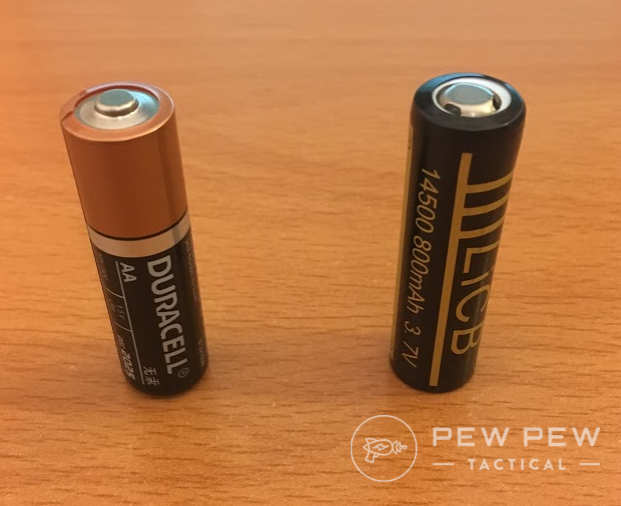
Most modern trail cams run on simple AA batteries. A set of fresh AAs should last through preseason scouting to the final day of deer season. That’s about six months for the non-hunting folks in the room.
My advice: Upgrade to lithium batteries.
-
25% off all OAKLEY products - OAKLEY25
Copied! Visit Merchant
Yeah, they’re more expensive, but they will last longer than cells and aren’t as affected by temperature.
In fact, good lithium batteries will continue to power your trail cam even if it’s covered in snow or frozen in a block of ice.
Viewing Screen
Not every game camera features a viewing screen, but it can be a really handy feature.
Admittedly, hauling SD cards home to view on your home computer can feel a little like the anticipation small children feel on Christmas morning. That said, a built-in viewing screen lets you get a sneak peek of your captured images right in the woods.
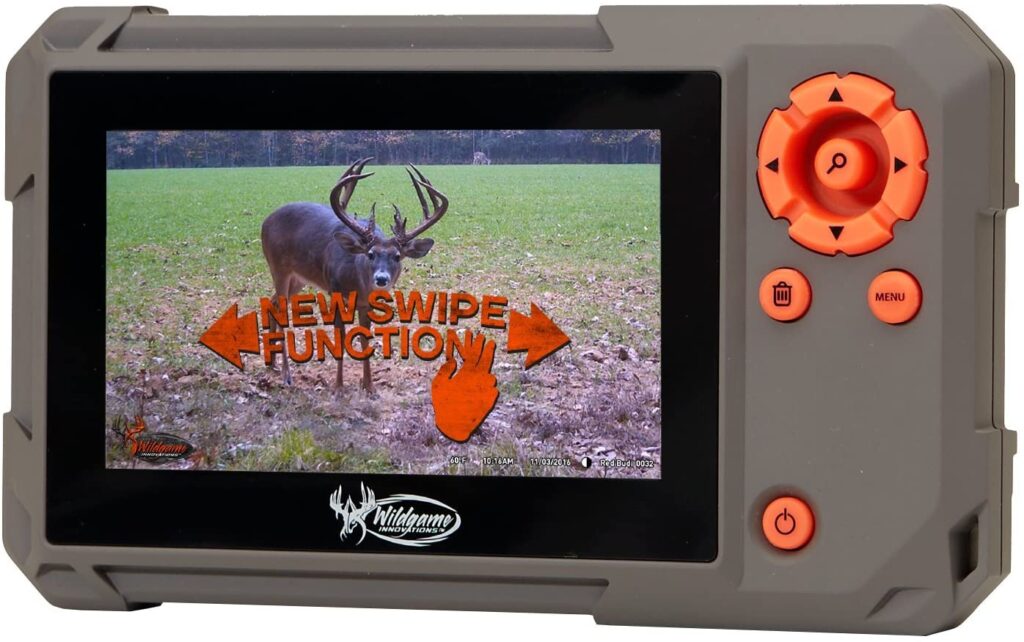
Models that include a viewing screen tend to be on the pricier side. The screens are also relatively tiny, so you aren’t going to see a ton of detail. You can also purchase a separate, portable SD card reader screen.
If you just can’t wait until you get home to see your images but don’t want to lug a whole laptop into the woods while you run your camera line, these compact devices are the perfect solution.
Wireless Connection
What if you need to see the images your trail cam captures without going into the area to retrieve SD cards?
A modern trail camera sporting a wireless feature is the answer to your prayers.
These cameras capture images just like standard devices, only they send the photos or video to your smartphone or email instead of storing them on an SD card. Trail cams with wireless connection tend to come with a hefty price tag. You’ll also need to pay for wireless service, which adds an extra expense.

If you need to place your cameras in a remote location with spotty or unreliable cell service (or none at all), a wireless connection is going to be pretty useless.
However, suppose you need to see images in real time, especially if you’re using cameras as part of your home security system. In that case, devices with wireless connections are well worth the extra cash.
Megapixels Aren’t as Important as You Think
Megapixel literally means “one million pixels.”
Pixels are the itty-bitty dots of light that, when viewed all together, create a picture. In the photography world, the more megapixels in an image, the better the photo quality.

When it comes to megapixels and trail cameras, things get a little trickier.
It’s easy to think buying a trail cam with a bunch of megapixels will give you magazine-quality photos, but that isn’t necessarily true.
Most megapixel ratings on trail cameras are interpolated, meaning the image resolution is enhanced using software — it’s a way for companies to cheat, really.

Instead of sharp, fine image detail, the camera uses an algorithm to digitally predict and add made-up pixels for every real pixel it captures. Other times the camera just duplicates pixels to increase the numbers.
Why do companies do this? Because they can slap that huge megapixel claim on the product packaging.
For most trail cam applications, mind-blowing image detail isn’t necessary. You just need enough clarity to identify subjects. In this arena, even cheap models with fewer megapixels are usually plenty capable.
Final Thoughts
Watching what’s going on when you’re not around can be a productive way to protect your property, or fill your freezer, depending on how you choose to use your trail cameras.
For hunters, particularly, getting brief glimpses of the everyday lives of the animals we’re pursuing is fascinating. And the more cameras you have in your arsenal, the more glimpses you’ll get.

Have any cool trail cam captures? We want to see them! Tell us all about them in the comments below. If you’ve got a trail cam, you might want to consider a feeder to go with it. Check out our roundup of the Best Deer Feeders.
Latest Updates
May 29, 2024: Removed multiple products and replaced them with the following: Moultrie Mobile Edge Pro, Moultrie Mobile Edge, Wild Game Innovations Encounter 2.0, Browning Dark Ops Full HD Extreme, Muddy Matrix Cellular Trail Camera, Stealth Cam Prevue 26. Added pros & cons for each product. Supplemental data was added for each trail cam.

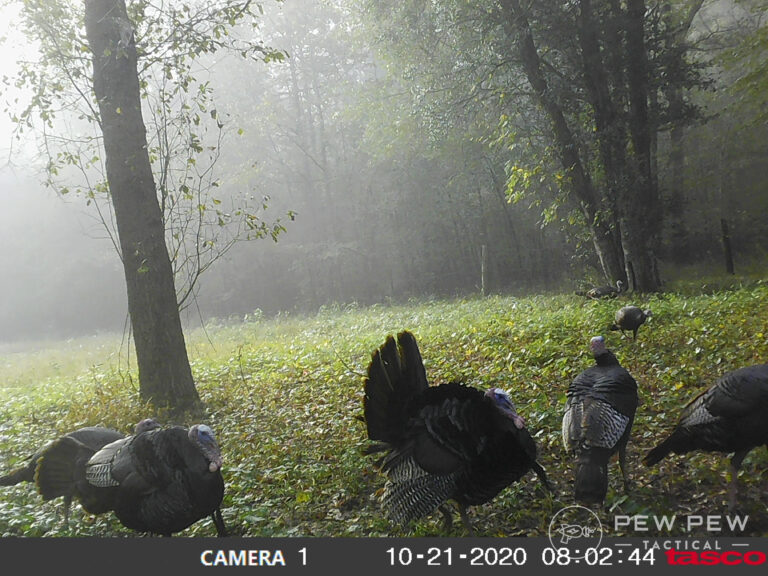
















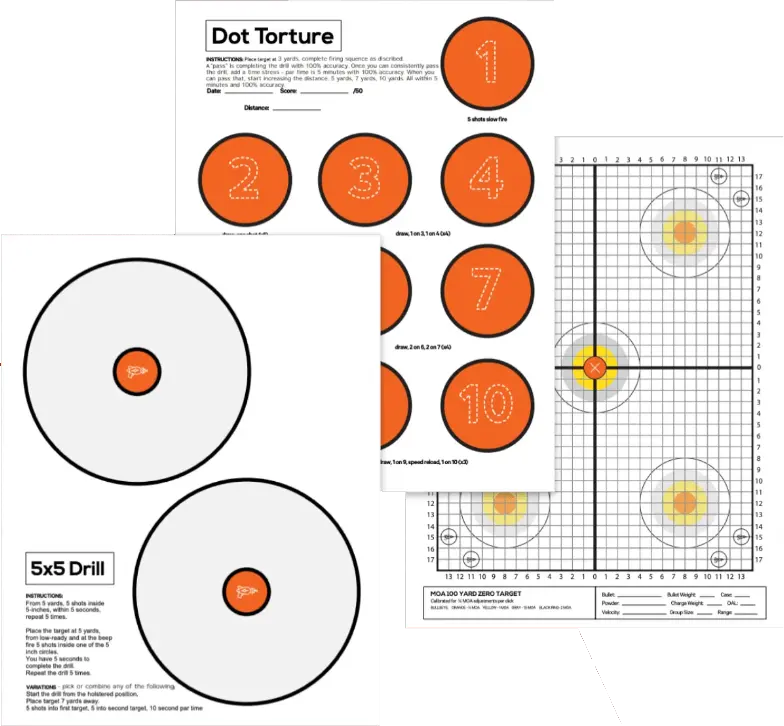
1 Leave a Reply
Thank you for sharing your comprehensive guide to the best trail cameras for every budget! As someone who enjoys outdoor activities like camping and hiking, I'm always on the lookout for reliable and high-quality trail cameras to capture images of wildlife and nature. Your detailed analysis of the various cameras on the market and their features was very helpful in understanding their capabilities and limitations. I appreciate the focus on different budgets, as this can be a major consideration for many outdoor enthusiasts. The breakdown of each camera's key features, pros, and cons was also very informative in making an informed decision. Thanks for sharing your expertise and experience with trail cameras – this guide is definitely a valuable resource for anyone looking to purchase a new one!